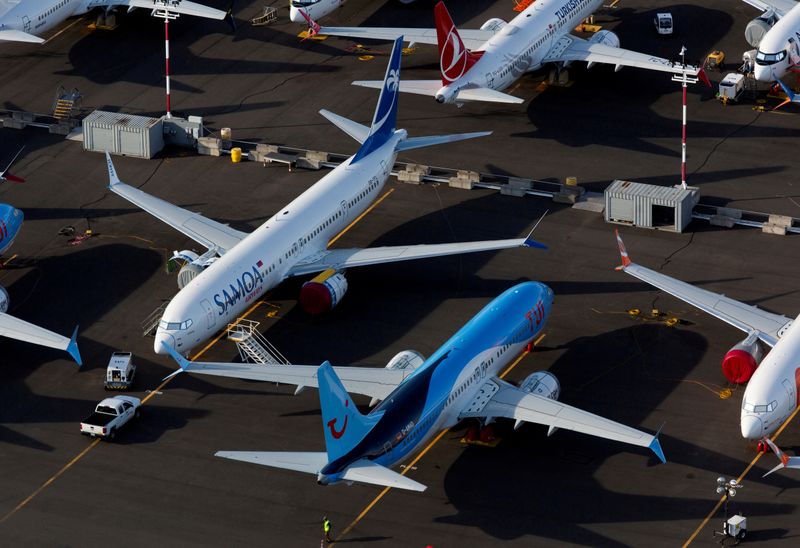This post was originally published on this site
https://i-invdn-com.akamaized.net/trkd-images/LYNXNPEG6K10Z_L.jpg
SEATTLE/NEW YORK (Reuters) – Before the 737 MAX and COVID-19 crises rocked aviation, Boeing (N:BA) offered a major 737 supplier, Teledyne Controls, a take-it-or-leave-it deal.
If the Teledyne Technologies (N:TDY) unit also wanted to be a top-tier supplier on the blockbuster 737 MAX program and a future jet codenamed NMA, it had to slash prices for its data systems, according to a person familiar with the situation.
It also needed to give Boeing a share of the higher-margin work for repairs.
Like hundreds of suppliers facing similar demands from Boeing and European rival Airbus (PA:AIR), Teledyne agreed to sell its parts at razor-thin margins. In exchange, Teledyne and other U.S. suppliers thought they were guaranteed profits for 20 years, fueled by record output of Boeing 737s and Airbus A320s.
But the 15-month-old MAX grounding, prompted by two crashes, and now the COVID-19 pandemic have left the plans in tatters.
Already weakened by a decade of pressure from Boeing and Airbus to cut prices and invest in new technology, U.S. aerospace firms now face a wave of bankruptcies, restructurings, takeovers and mergers, industry sources and bankers say.
Teledyne Controls has laid off more than half of the 600 or so workers at its El Segundo, California factory, and closed its Seattle-area office, with more cuts expected, the person familiar with the situation said.
Triumph Group (N:TGI), which makes parts for Boeing’s T-X training jet, is also planning a large layoff this summer and is studying selling off businesses and other options, according to another person familiar with the matter.
Teledyne and Triumph did not answer requests for comment.
Boeing declined to comment about individual suppliers.
The planemakers’ strategy toward suppliers had already triggered consolidation as companies looked to bolster their negotiating power.
Now, Boeing and Airbus face a dilemma between letting industrial juggernauts like Raytheon Technologies (N:RTX), with a $95 billion market value, absorb smaller companies and boost their pricing power, or shelling out precious cash to bring technology in-house.
PARTS SHORTAGES
Teledyne joins Kansas-based Spirit AeroSystems (N:SPR), Britain’s GKN (LON:GKN) [GKNHL.UL], Montreal-based Heroux-Devtek (TO:HRX), and many others in shedding jobs.
The downturn has led to grumbling from some suppliers that Boeing is not pulling its weight.
Boeing argues it poured billions of dollars into the supply chain by producing 737 MAXs for months even after the jet was grounded in March 2019, people familiar with its thinking say.
Boeing, which has also invested heavily in its factory and hiring to prepare for higher output, bears more of the risk throughout multibillion-dollar programs, they add.
“There are so many mouths to feed and not enough food to go round,” one supply chain source said.
In April, Boeing bypassed the government support it had initially lobbied for and raised $25 billion in debt, one of the largest investment-grade bond issues of all time.
At the time, Boeing said the sale would “keep liquidity flowing through our business and the 17,000 companies in our industry’s supply chain.” Boeing has also paid Spirit $225 million for fuselages it did not immediately need.
Now, industry sources say Boeing is putting pressure on its largest “tier 1” suppliers to flow money down to smaller “tier 3” and “tier 4” parts manufacturers, some of which have also applied for the COVID-related U.S. payroll protection program.
Kevin Michaels, managing director of AeroDynamic Advisory, said Boeing needed to do more, such as paying supplier invoices in 60 days instead of 90, and backing off on a campaign to bring in-house technology long-supplied by outside firms.
With failures likely, planemakers face potential parts and skill shortages, Michaels said.
“I think the challenges ahead are underestimated by both Boeing and Airbus,” Michaels added.
A Boeing spokesman said: “We are working closely with our airline customers and our suppliers to manage through the unprecedented downturn and balance supply and demand going forward.”
Airbus was not immediately available for comment.
PAYCHECK TO PAYCHECK
Boeing has said it expects to reach production of 31 737s monthly during 2021. That means Boeing will more than double the rate in a few months, as industry sources say it will only reach 14 per month by the end of 2020.
Boeing sees 14 per month as low enough to begin to clear an inventory of 450 new 737 MAX jets once U.S. regulators clear it for service, but high enough to keep suppliers on life support.
Airbus is also producing 40 narrow-body jets a month, partly to stabilize the supply chain, a senior European source said.
For some suppliers, the damage will be tough to reverse.
As of June, Teledyne Controls’ revenue had plunged some 50%, the person familiar with the situation said.
Nor is there much hope for new business on the horizon after Boeing shelved plans for its mid-market NMA jet.
“With how ugly business looks and how bad the forecasts look, I would not be surprised if Teledyne (Controls) is sold off,” the person said. “The question is, who would buy it?”


